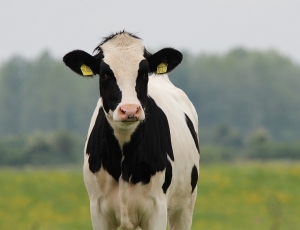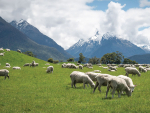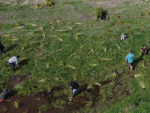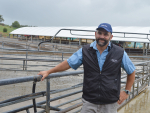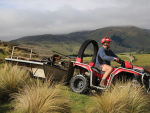The NZ Veterinary Association and the Ministry for Primary Industries are warning farmers to be even more alert for facial eczema with the forecasted strong El Nino conditions.
During El Nino New Zealand tends to experience stronger or more frequent winds from the west in summer, leading to drier conditions in the north and east, and more rain in the west.
With rises in humidity, the risk of facial eczema also increases along with the risk of a decline in milk production in dairy herds. For dairy cows, beef cattle, sheep, deer and goats, the disease also damages livers, affects bile ducts and causes sensitivity to sunlight.
Taking preventative measures now, rather than waiting for spore counts to rise, is recommended with zinc treatment starting two to three weeks before the spore growth danger period for maximum protection.
Fungal spores growing in pasture – especially fresh, new grass, are the root cause and spore counts increase where grass temperatures are above 12°C for three consecutive nights. Counts can vary from farm to farm and even between paddocks.
SealesWinslow animal nutrition expert, Jackie Aveling, says dairy farmers especially should adopt a prevention strategy to protect production of valuable milk solids given the low payout year.
"When conditions are ideal for grass growth – such as warm, wet weather – they are also ideal for facial eczema. It's also disease which is hard to detect in its early stages, so all too often farmers are not aware it has taken hold until it's too late. That's why a prevention strategy is as important as the disease can cause production losses of up to 50% if it goes unchecked."
Zinc treatment from late December through to May is commonly used to help prevent facial eczema. However dosing troughs with zinc sulphate doesn't always deliver the best results since the bitter taste puts herds off the water.
The alternative is Zincmax+, a combination facial eczema treatment with Agricultural Compounds and Veterinary Medicines (ACVM) registration.
"Its peppermint taste makes it palatable and it includes organic copper. The taste helps ensure herds keep up their water consumption, which is important given their needs can exceed 100 litres at this time of year," says Aveling.
The organic copper helps offset zinc's antagonistic affect which reduces the absorption of this important trace element. Copper is important for production, immune response and also cycling ahead of breeding. Low copper levels can also affect growth and fertility in heifers.
Symptoms
· The first sign of FE is a drop in milk production occurring soon after the intake of toxic spores (subclinical FE).
· Cows are restless at milking time, seek shade, and lick their udder.
· Another drop in production occurs when physical symptoms (clinical FE) become obvious.
· Check unpigmented or thin skin which thickens and peels because of sun sensitivity.

